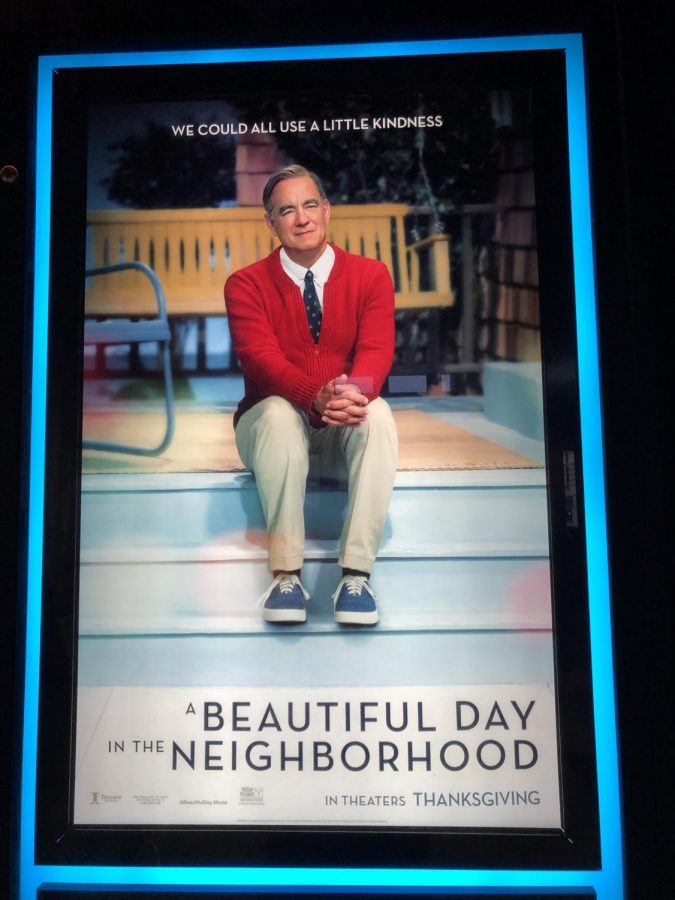“A Beautiful Day in the Neighborhood” honors beloved TV show host Fred Rogers
On Nov. 22 2019, the film A Beautiful Day in the Neighborhood was released into theatres all over the United States. Based on the friendship between journalist Tom Junod (Matthew Rhys) and Fred Rogers (Tom Hanks), this drama highlights the importance of kindness and acceptance during hard times.
December 27, 2019
Starring Tom Hanks, “A Beautiful Day in the Neighborhood” introduces the true meaning behind the TV show “Mister Rogers’s Neighborhood” and the importance of kindness in everyday life.
Written by Micah Fitzerman-Blue and directed by Marielle Heller, this inspiring drama is based on the friendship between the charming children’s TV show host Fred Rogers (Tom Hanks) and cynical writer for Esquire magazine Tom Junod (Matthew Rhys). Junod requested that the producers give him a pseudonym, Lloyd Vogel, as some events that were shown in the film did not actually happen to the journalist in real life. The film gives an inside look into two well-known and contrasting personalities, as well as the struggles that each of them faced.
After being given the assignment to interview the infamous TV show host, Lloyd realizes that writing an article for a publication would be an impossible feat due to his difficulty accepting his feelings and recurring inability to avoid giving harsh criticism in his writing. Lloyd’s troubling past experiences, including the death of his mother and abandonment of his father, made it hard for him to see eye to eye with people–he was convinced that everything was an act. After finally mustering up the courage to head down to Pittsburgh, the several meetings that Lloyd has with Mr. Rogers allow him to realize that there is a lot missing from his own life and gives audiences an inside look at a more personal aspect of his career.
During a majority of his interviews, Lloyd asks Fred specific interview questions and after he answers each question, Fred quickly reverts the subject back to Lloyd, as if Fred were the reporter, and Lloyd the interviewee. At first, Lloyd finds Fred’s personality quite difficult and cheesy, but over time he realizes that he genuinely cares about whomever he talks to. Through their honest conversations, Fred is able to discuss with Lloyd his difficulties as a parent and about how a life without pain does not exist.
After Lloyd and Fred get to know each other, Lloyd further analyzes his relationship with his wife Andrea (Susah Kelechi Watson) and his role as a parent with his newborn son Gavin. He does this after Fred introduces the idea that healing takes time, and that a lack of structure at times can be necessary to truly appreciate life’s little moments and the people in it-even if forgiveness feels impossible.
While this film focuses more on Lloyd’s life and character development, Fred Rogers is also somewhat seen in a new light, as many people see him as a hero rather than a human being that makes mistakes just as often as everyone else.
The film provides a nostalgic feeling of warmth and familiarity for many audiences, as almost half of the scenes are filmed at the WQED studio in Pittsburgh, where the actual filming of “Mr. Rogers’ Neighborhood” took place in the late 1960’s. The original soundtrack, developed by Nate Heller, perfectly shapes Lloyd’s feelings of comfort and empowerment. It also depicts specific moments with uncertainty and reflection.
While this movie is rated PG-13, its target audience is gravitating more towards older people, especially those who grew up watching “Mr. Rogers’ Neighborhood.” The topics in the film are relatively heavy, and even though there are aspects that everyone can relate to, most of the actors are adults. This makes it seem as if perspectives may differ with different age groups.
Although the events in this film might not directly apply to every age group or audience, the universal message of kindness remains prevalent. Even for those who have not grown up watching Mr. Rogers’ show, the actors’ performances in this film brings the characters’ experiences to life and allow audience members to look into their own lives–striving to become better, more forgiving people.
As Fred Rogers once said: “All of us, at some time or other, need help. Whether we’re giving or receiving help, each one of us has something valuable to bring to this world. That’s one of the things that connects us as neighbors–in our own way, each one of us is a giver and a receiver.”


